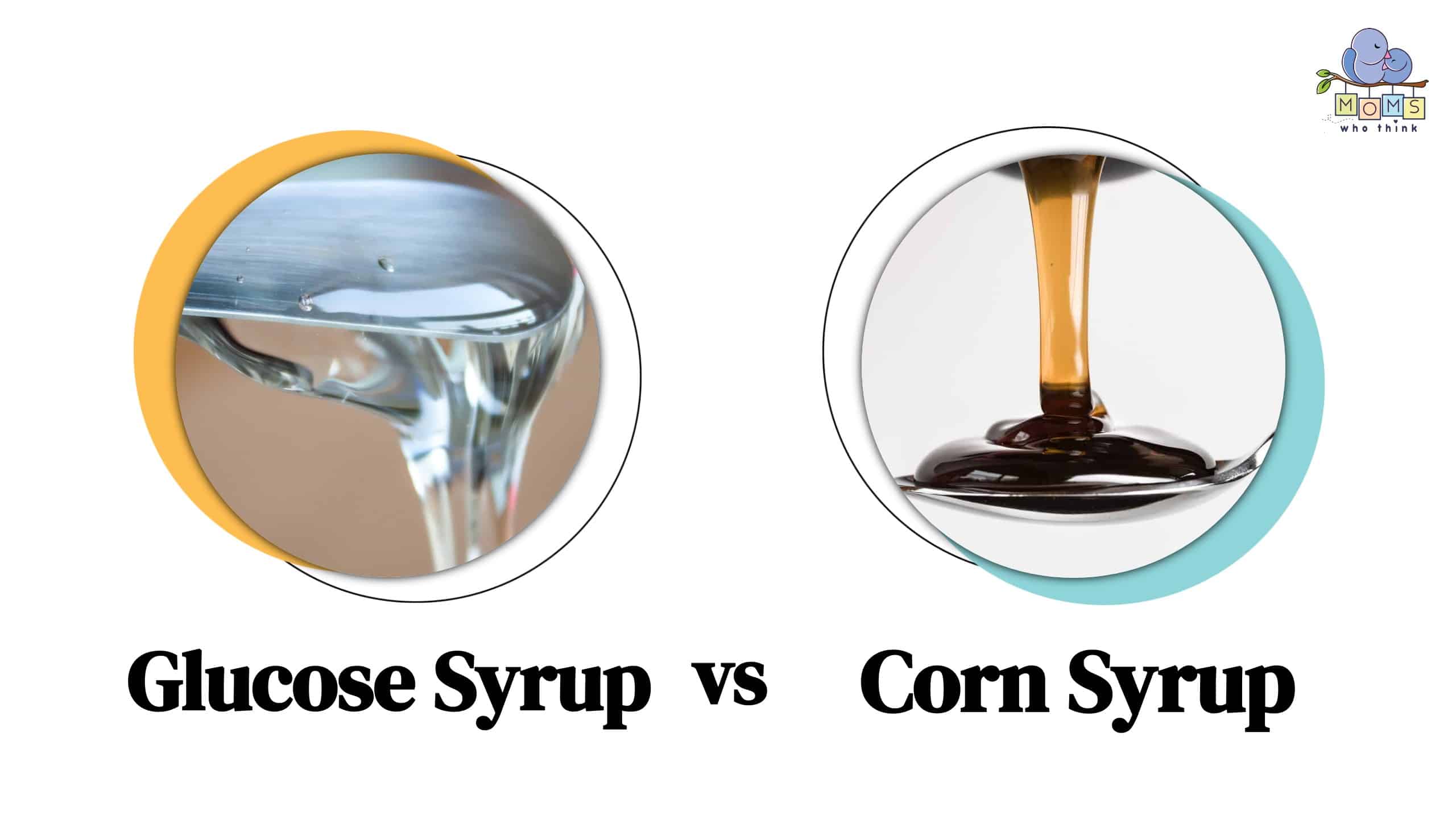Glucose syrup and corn syrup are liquid sweeteners that are commonly used in a variety of food products. Both syrups come from starches, but there are difference in how they're made.
Glucose syrup and corn syrup can be used to provide sweetness, bulk, and texture to many different types of food products including candy, cereal bars, baked goods, sauces, and more. In this post, we look at the differences between the two, their uses, their benefits, and so much more.
Glucose Syrup vs. Corn Syrup: What’s the Difference?
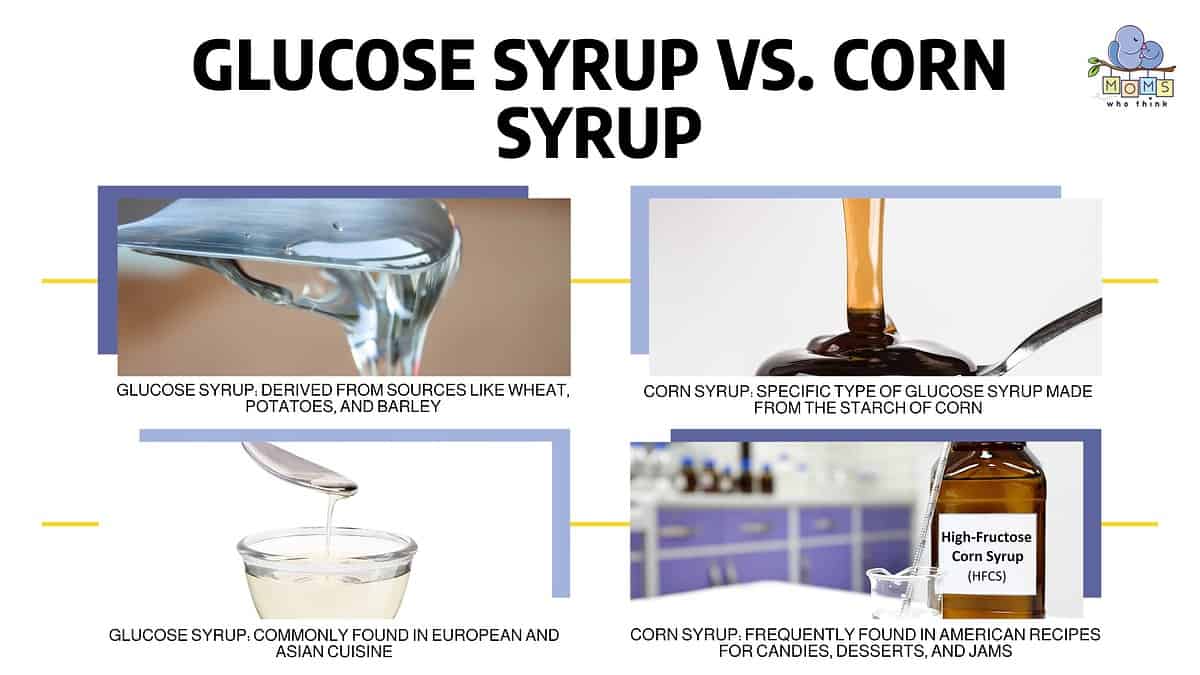
The primary difference between glucose syrup and corn syrup is that glucose syrups is derived from sources like wheat, potatoes, and barely while corn syrup is a specific type of glucose syrup made from the starch of corn.
Each syrup has different flavor profiles with glucose syrup offering a milder taste than corn syrup. This mild taste makes glucose syrup popular in international dishes while corn syrup is often found in candies and other sweet products.
Corn syrup is more controversial in part because highly processed versions like high fructose corn syrup have been linked to obesity and other health risks. High fructose corn syrup is used in many U.S. products like soda as companies prefer its unique sweetness and other qualities like keeping treats more moistened. We'll discuss high fructose corn syrup in more detail below.
The Science Behind Glucose Syrup and Corn Syrup
Glucose syrup is produced by breaking down large molecules known as polysaccharides into smaller molecules, while corn syrup is produced by separating components of cornstarch into glucose molecules.
Glucose syrups rely on various starches, such as potatoes or rice, that undergo enzymatic processes breaking down these materials into simple sugars before turning into liquid form. Corn syrup sources almost all its constituents directly from the eponymous crop – cornstarch!

Both glucose syrup and corn syrup are important additions to your favorite candy treats.
©stockcreations/Shutterstock.com
Hydrolysis processes convert starches to simple sugars like glucose and maltose, producing popular edible substances like corn syrup. Instead of fructose or sucrose, commonly found in other syrup types like glucose, corn syrup garners appeal because of their smooth texture and delicate sweetness.
These qualities make it a common ingredient in food items such as candies (e.g., taffies), ice cream (less crystallization side effect), soft drinks (for sweetness) even baking items (moistness retention). Glucose syrup shares similar beginnings with corn syrup because the procedure that converts one into a sugar solution derived from plant sources remains the same.
What Is Glucose Syrup?
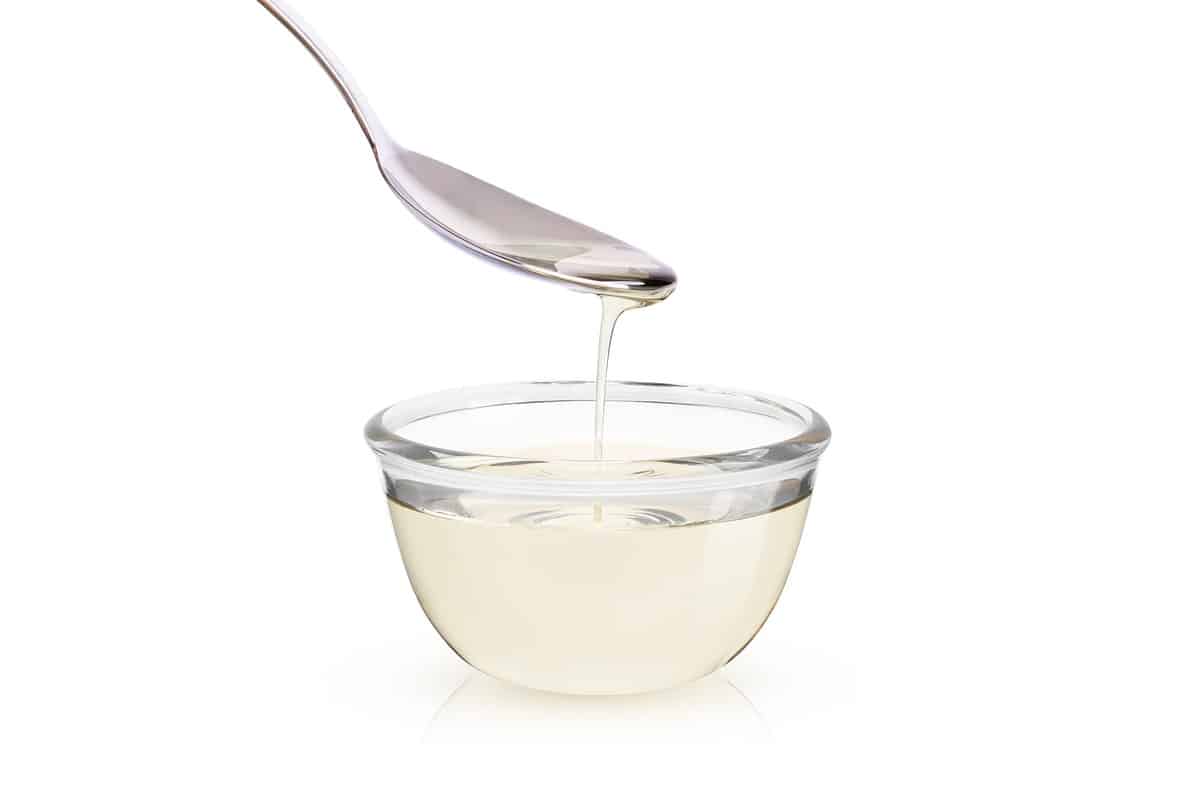
Sugar syrup (glucose syrup) in glass bowl
©NIKCOA/Shutterstock.com
Glucose syrup is a type of sugar solution produced by breaking down starch into simple sugars and then cooking them to reach the desired consistency.
Types of Glucose Syrups
Meanwhile, several kinds of glucose syrups exist with distinct attributes based on their source; examples include;
- Potato-based glucose syrups are known to resist crystal formation and yield a less sweet taste than other types.
- Rice-based glucose syrups can help impart glossiness when utilized as coatings, among others.
- Corn syrup: It is still the most popular due to its mild taste profile and is sourced directly from maize starch. The science of baking hinges on the precise balance of ingredients that go into it – even tiny proportions can make all the difference! One such ingredient that performs the crucial function of preventing crystal formation while retaining softness is corn syrup. A valuable add-on for dessert connoisseurs- it enhances the textural quality of ice creams too!
- Wheat syrup: Another favorite among bakers – derived from wheat starch boasts of its precise golden-brown color with slightly malty notes and finds versatile usage as a sweetening agent across cakes, cookies, and baked items alike while also contributing engaging moisture content that ultimately culminates into perfect tenderness.
Even savory dishes such as meatloaf or sauces could benefit from a touch of wheat syrup.
- Potato syrup: The thick-textured potato syrup is popular in commercial enterprises. It makes up for an excellent creamy additive that effortlessly compliments soups, stews, or sauce preparations with equal ease, featuring prominently among many food products!
- Rice Syrup: Made from partially hydrolyzed rice starch, rice syrup has also garnered considerable following, given its usage in creating delightful puddings, glazes, and baked goods.
Uses of Glucose Syrup
In the production of drinks, glucose syrup is an effective sweetening agent that adds flavor and improves the overall taste profile of soft drinks, fruit juices, sports drinks, and energy drinks. Its wide array of applications makes it an essential ingredient in the beverage industry.
The versatility of glucose syrup makes it an essential ingredient in the food industry. Having sweetening properties that go hand in hand with smooth textures gives products added mouthfeel precision. The ability to regulate moisture retention also aids consistency with regard to controlling flow.
In baked treats like cakes, cookies, muffins, and bread, the integration of glucose syrup ensures longevity on shelves alongside added glossiness. Consequently, this has led to an inclusion tendency in recipes for icings, jams, jellies, and spreads. Confectionery items like candy, caramels, fudges, toffees, and other sweets are all unique to their integration.

Adding glucose syrup to sweet treats prolongs their shelf life and keeps them looking good!
©Yuriy Golub/Shutterstock.com
Additionally, it acts as an effective preservative by preventing sugar crystallization, ensuring stability over time. Ice cream makers are indebted to this wondrous substance since it results in smoother decadence and prolonged shelf life.
In conclusion, the food industry is grateful to glucose syrup for its indispensable properties that guarantee optimal product quality.
Benefits of Glucose Syrup
Food manufacturers rely heavily on glucose syrup due to its many beneficial properties that enhance overall product quality significantly. The most prominent benefit is derived from the fact that glucose syrup has a notably low freezing point making it useful for countless applications, including frozen dessert products like ice cream; however, this is just one benefit among many others.
Its high viscosity provides noticeable improvements as an excellent thickener or texturizer for savory sauces, candies, and various confectionery items alike; simultaneously serving as a sweetening agent means that this versatile ingredient can improve almost any dish flavor while helping maintain balanced consistency through all stages of preparation.
The crucial benefit that stands out most when using glucose syrup as an ingredient is the ease of creating frozen desserts and products like ice cream due to its low freezing point. Those who frequently work with food ingredients may appreciate the ease of use factor of incorporating glucose syrup into their recipes – no nasty clumping or crystal formation to worry about!
But that's not all, folks: this low glycemic index value sweetener works great for individuals watching their sugar intake while still seeking a product with superior taste.
Glucose syrups texturizing properties are also quite impressive – think of it as a kind of glue that brings together ingredients for perfect consistency in special dishes, especially those requiring an emulsifier or stabilizer.
Aside from its culinary benefits, glucose syrup's presence helps prevent sugar crystallization in high-temperature stored products (perfect for all your jam and jelly makers out there!) and can even give food items prolonged shelf life through its microbial growth-limiting effect.
What Is Corn Syrup?
A sweetener extracted from corn starch, corn syrup is known for adding flavor and texture to various foods. Beyond these benefits, however, it effectively prevents oxidation reactions that would otherwise compromise the color and aroma quality of products over time.
Types of Corn Syrup
- Light Corn Syrup: This marks one type of this widely used product. Featuring mild notes supported by real vanilla extract, it maintains a translucent hue while being incorporated into various recipes such as pecan pies or frostings.
- Dark Corn Syrup: This captures the distinct flavor through additional molasses content, sporting a darker color than light corn syrup, additionally containing more calories and carbohydrates. Thus becoming popular when used in baked goods such as pies, cakes, and brownies.
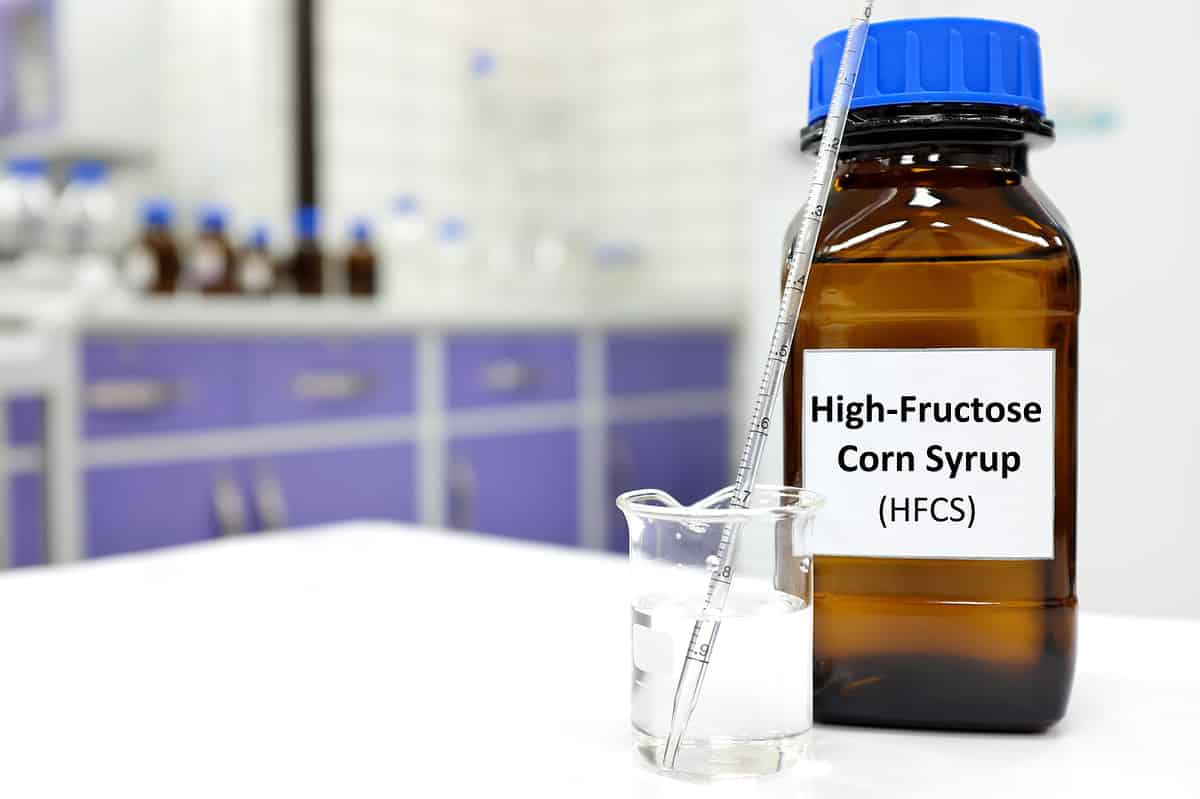
HFCS is a great alternative for food industry players looking to steer clear of granulated sugar.
©sulit.photos/Shutterstock.com
- HFCS: High Fructose Corn Syrup (HFCS) comes from highly refined cornstarch that undergoes processing before transforming into the sweetener we know today. Its unique composition contains more fructose than regular corn syrup hence preferred by many food producers looking for alternatives for granulated sugar in their products. Thanks to its unique sweetness profile and ability to keep baked treats fresh and moistened in dessert settings.
Uses of Corn Syrup
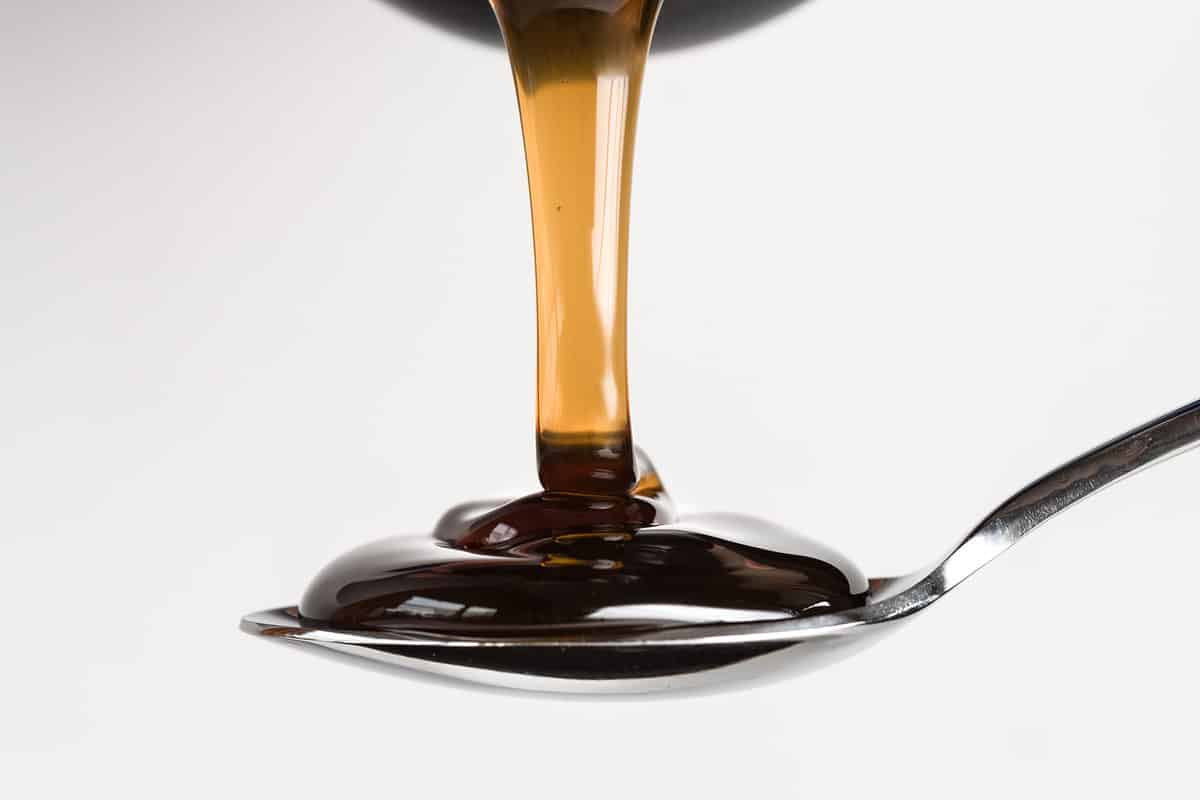
Dark corn syrup on a spoon
©Michelle Lee Photography/Shutterstock.com
Corn syrup remains an attractive option for cooking enthusiasts who desire an added layer of sweetness without any alterations to the taste or composition of their recipes. It is a multi-purpose ingredient counted as a flavoring, thickening agent, or primary ingredient in creating food items such as candies and baked goods like cakes and muffins while enhancing product texture. Corn syrup is one of those wonder ingredients essential in many ways across the food industry.
Its dual functionality provides sweetness and texture in popular products like soft drinks, fruit juices, ice creams, and milkshakes; you name it!
But that's just the beginning – this unsung hero plays a significant role in cooking and baking preparations across households and professional kitchens. The ability of corn syrup to thicken sauces or gravies makes it a true asset in any kitchen setting. And barbeque lovers swear by its capacity to enhance flavors while adding an extra dose of sweetness to their signature sauces.
But beyond this culinary context lies a world where corn syrup still reigns supreme – an essential part of food preservation methodologies or alongside pectin when making jams or jellies.
So versatile is this simple ingredient that it even plays a vital role in the texture and stability of beloved treats like marshmallows or gummy bears! Let's not forget either about some classic favorites like candy bars or peanut butter cups; none of these would be possible without corn syrup playing its important part behind the scenes. Corn syrup is a cornerstone solution across the entire food manufacturing industry with many processed foods, especially needing an ingredient that adds sweetness without contributing too much sugar.
Benefits of Corn Syrup
A go-to favorite among many food manufacturers looking to achieve delicious treats at minimum costs is corn syrup – a versatile sweetener perfect for coating cereals, snack foods, and granola bars.
This affordable option is an excellent substitute for other costly sweeteners such as honey and sugar while still delivering on taste quality. The beauty of corn syrup lies in its ability not to change the flavor or texture of foods but instead enhance them with consistency and color options- making it ideal for use in various recipes like baked goods and candy.
Its dietary fiber content also significantly promotes good digestive health while aiding weight loss by reducing blood sugar spikes.
Most people are familiar with the potential benefits of fiber consumption, particularly concerning cholesterol reduction and heart health support. Additionally, corn syrup boasts a nutritional content that consists largely of important vitamins and minerals, including calcium, magnesium, phosphorus, potassium, iron, and zinc. Crucial minerals like these play their part in optimizing metabolic functioning while simultaneously helping maintain healthy organ operation.
What's fascinating about corn syrup is its potential positive impact on bone health through its mineral composition, with some research showing protective effects against osteoporosis.
Can You Substitute Glucose Syrup for Corn Syrup?
For those considering substituting corn syrup with glucose – it's possible! As far as differences go, though, the latter is sweeter tasting yet thinner consistency-wise due. This is primarily due to being made from wheat, corn, or potato starches rather than maize.
Glucose intake can result in an almost immediate energy boost thanks largely to its higher levels of simple sugars. Sugars that break down readily offer an instant energy boost, which is why glucose syrup has found favor with confectioners and bakers worldwide.
Its ability to lend baked goods and candies a gorgeous sheen makes it highly sought after in the culinary field; corn starch-based corn syrup offers similar benefits and an ability to maintain food shape despite high heat exposure.
Are Glucose Syrup and Corn Syrup The Same Thing?
While wheat or corn is the starting point for both syrups, they differ significantly. Glucose syrup contains fewer complex sugars and chemicals than its counterpart, making it more refined overall.
Sugar substitution-wise, glucose syrup can serve as a sweetener ingredient, whereas corn starch is mainly for adding texture and volume. Fortunately, honey or maple syrups act as good alternatives for those looking to replace glucose syrup in recipes calling for its use. These natural sweeteners mimic the original's texture properties, adding naturally sourced sweetness without consuming processed sugars.
What are Substitutes for Glucose Syrup?
Glucose syrup is an essential ingredient for many recipes; however, finding this specialty item outside designated outlets may pose significant difficulties. In such scenarios knowing suitable substitutes comes handy; we highlight some options below:
- Corn Syrup: A viable contender when seeking out alternatives for glucose syrups is corn syrup since it shares many similarities with its counterpart. One of them is that they are both products of starches. The thickness and sweetness match up well, making it a recurring choice in most pantries despite its lack of availability.
- Honey: As a natural alternative, honey is prominent among cooks who value organic products with unique flavor profiles. While it cannot entirely replicate glucose syrups' neutral taste, the distinctive sweet taste makes it ideal for baking and cooking.
- Agave Nectar: A popular substitute for various sugar-based products, including glucose syrups, it proves a capable contender with its matching viscosity and relative sweetness. Despite being less readily available than other alternatives, you can still find it in many health food stores or online retailers.
- Maple Syrup: As a versatile ingredient in baking, maple syrup has earned high praise from many bakers due to its exceptional sweetness and distinctive taste. Additionally, this natural substitute has added nutritional benefits compared to glucose syrup, which contains higher mineral content. That said, given its comparative expense compared to other alternatives on the market today, maple syrup may not always be the most viable suggestion for all bakers seeking a choice for their recipes.
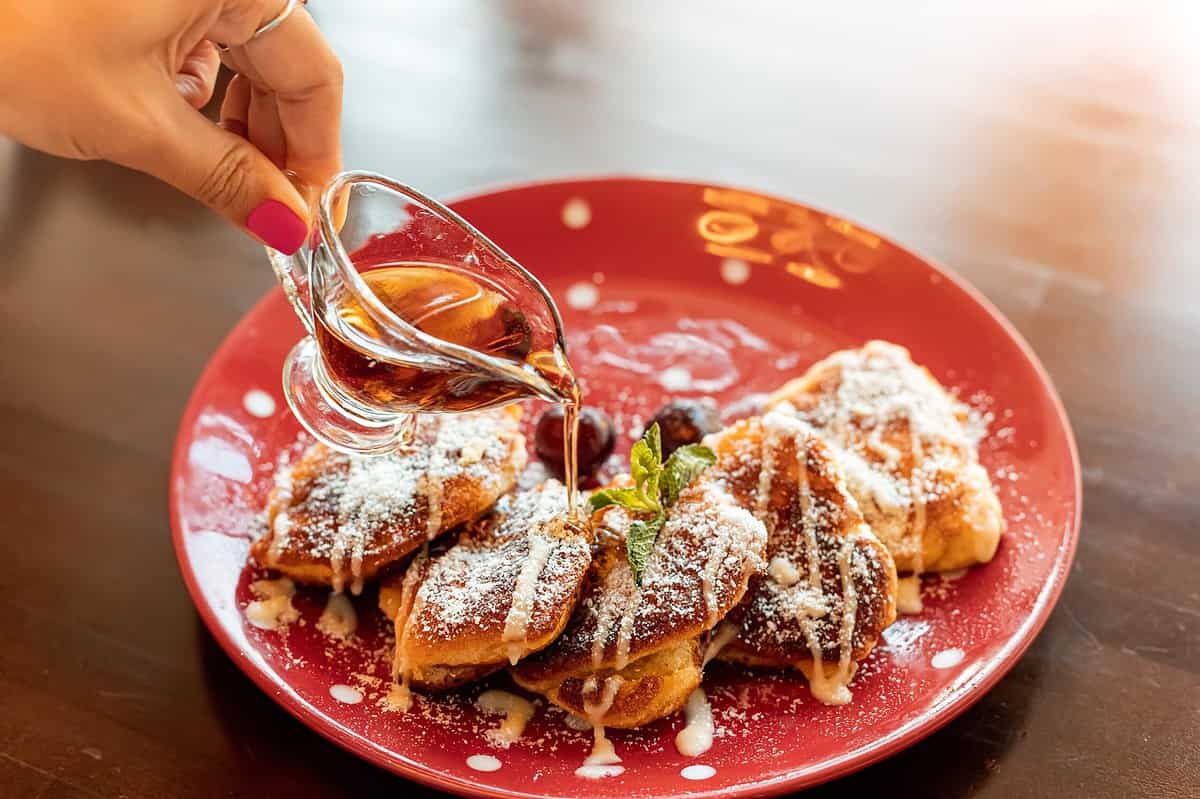
Maple syrup is one of the higher-end substitutes for both glucose syrup and corn syrup.
©frantic00/Shutterstock.com
What Are Substitutes for Corn Syrup?
Corn syrup might be a go-to ingredient in many recipes, but what about when you need or want to switch things up? If you're looking for alternatives that provide comparable levels of sweetness with extra benefits, then read on.
- Honey: This is one option that not only offers its distinct flavor but also boasts minerals, vitamins, antioxidants, and amino acids that make it far superior to corn syrup from a nutritional standpoint.
- Maple Syrup: Or why not try maple syrup, which offers light sweetness and fewer calories than its processed counterpart? Plus, it's full of antioxidants, magnesium, and zinc, essential nutrients your body will appreciate.
- Brown rice syrup: This is an excellent choice if you're trying to steer clear of refined sugars – offering the same great taste without any unwanted additives. Accessible at most health food outlets or online platforms such as Amazon.
- Agave syrup: It offers a desirable option for those seeking a substitute for corn syrup. Sourced from the agave plant, this naturally derived product features a mild sweetness profile removing any additional need for sugar or other sweetening agents. Because of its relatively fewer calorie content than corn-based products and the presence of important minerals such as calcium, potassium, and magnesium, among others, agave serves as a practical choice with higher nutritional benefits compared to traditional options like corn-based syrups.
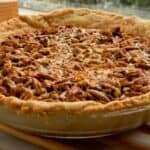
Pecan Pie With Corn Syrup
Ingredients
- 1/4 cup butter
- 2/3 cup brown sugar, firmly packed
- 1/4 teaspoon salt
- 3/4 cup Karo dark corn syrup
- 3 eggs, beaten
- 1 teaspoon vanilla
- 1 single-crust pie pastry, unbaked (recipe here)
- 1 1/2 cups pecan halves
Instructions
- Cream butter and sugar together until fluffy; then add salt, corn syrup, eggs, and vanilla.
- Line a pie pan with pastry and sprinkle evenly with pecans.
- Pour the filling over the pecans, covering them completely.
- Bake in a very hot oven (450 degrees F) for 10 minutes. Reduce temperature to 350 degrees F and bake an additional 35 minutes longer or until the knife inserted into the center comes out clean.
